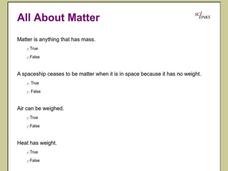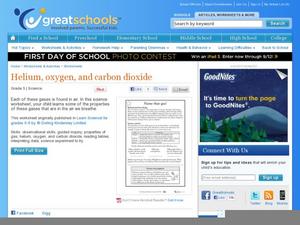Curated OER
Making Oxygen
Use demonstrations to enlighten learners on oxygen's role in combustion. Use potatoes and hydrogen peroxide to increase oxygen concentration in a jar, then stick a glowing splint and a burning wad of steel wool into the newly formed...
Curated OER
Solutions
Amateur chemists define and describe properties of solutions, compare solubilities, explain how solutes affect freezing and boiling points, describe acid and base properties, and more! This educational PowerPoint provides information and...
University of Wisconsin
Noting Notable Features for Rain Gardens
Eight groups in your class are each responsible for a different aspect of surveying the campus for a suitable rain garden location. Features to consider include water flow, topography, sun/shade patterns, land surface, vegetation,...
Curated OER
Ecosystems
A critical look into the structure and function of ecosystems is here for young learners as a series of lessons and worksheet activities. Topics covered include land-based and marine ecosystems, connections to the water cycle, food...
Curated OER
Investigating The Mysteries Of Third Grade
Third graders use logic and knowledge of mathematics facts to solve problems. They see that pigments can be broken down into separate colors. Pupils recognize the capacity of water to move upward and measure the height water travels up...
National Institute of Open Schooling
Colloids
Classes explore colloids through readings and questions in lesson 10 in a series of 36. They learn everything from methods of preparation and properties to how to classify colloids. They finish the lesson by seeing how to apply...
Teach Engineering
What Floats Your Boat?
Clay's as good a material as any to build a boat, right? An introductory lesson sets the stage for two activities associated with buoyancy. The first involves building boats out of clay, while the second uses these boats to measure the...
Curated OER
All About Matter
Twenty-four questions about matter, the states of matter and the properties of matter make up this interactive online instructional activity. Your class will determine the volume of water, the shape of water and the shapes of matter.
Curated OER
The Mighty Elements: Using the Visual Thesaurus to Investigate Chemical Elements
Pupils create trading cards for elements in the Periodic Table. Initially, they are introduced to the Periodic Table of Elements and the concept of elements in the world around us. After dividing into groups, learners use the Visual...
Curated OER
Weathering and Soil Formation
A set of 27 slides systematically shows how weathering, erosion, and deposition contribute to soil formation. Both chemical and mechanical weathering are described, as are resulting soil layers and properties. There is no longer any need...
American Chemical Society
Molecules Matter
Did you know that jumping spiders sometimes wear water droplets as hats? A seventh grade science lesson introduces the concept of what makes up water: tiny molecules that are attracted to each other. Starting with a...
EngageNY
Euler’s Number, e
Scholars model the height of water in a container with an exponential function and apply average rates of change to this function. The main attraction of the lesson plan is the discovery of Euler's number.
Beyond Benign
Breaking the Tension
The tension builds as learners experiment in your classroom. The 17th installment in a 24-part series has scholars investigate the concept of surface tension. After discovering characteristics of surface tension, they add a compound...
Curated OER
Cup Capacity Tool: Measuring Cup
Students examine containers and their capacity. They fill a one-cup measuring cup with water and pour cups of water into other containers. Through observation, students discover how many cups make a pint, and how many teaspoons make a...
Curated OER
Displacement and Density
High schoolers explore displacement. In this displacement and density lesson, pupils find the volume of irregular shaped objects. Afterward, they determine the volume of containers. They compute the amount of water displacement.
Curated OER
Rocks and Minerals
Review the difference between rocks and minerals using this resource. Learners identify and investigate the physical properties of these objects. They create a Venn diagram to compare and contrast types of rocks. This is a motivating way...
Science Friday
Ugh, a Bug!
Young entomologists familiarize themselves with the physical characteristics of insects. Composed of two activities, each instructional activity involves your scientists tapping into their prior knowledge of bugs and making observations...
NASA
Melting Ice: Designing an Experiment
Sometimes, despite the best laid plans, the unexpected will occur. Learners witness this firsthand as they carefully design an experiment to determine the time needed for ice to melt in salt water or pure water. They uncover facts not...
Messenger Education
Cooling with Sunshades
Messenger's sun shade measures 8 ft x 6 ft and will have temperatures reaching 700 degree Fahrenheit on the outside while maintaining a cool 70 degrees underneath. In the third activity of four, groups discuss the basic properties of...
Curated OER
Name That Gas!
Young scientists discover that air is a mixture of different gases - mainly nitrogen and oxygen. The properties of some of the other gases found in oxygen are listed in a table, then learners must decide which one of those gases is...
Teach Engineering
Determining Densities
Don't be dense—use a robust resource. The second installment of a five-part Floaters and Sinkers unit has learners determine the densities of several objects. As part of the activity, they learn the displacement method for finding...
Curated OER
Sink or Float?
Students investigate whether different objects sink or float in water using the Scientific Method. They listen to the book "Christopher Columbus" by Stephen Krensky, identify the steps of the Scientific Method, conduct the sink or float...
Curated OER
Towers of the Lost City
Middle school marine scientists compare the pH change in distilled and saltwater as acetic acid is added one drop at a time. Then they compare the pH change in both when sodium hydroxide is added. This experiment demonstrates the...
Curated OER
Blubber Mittens:Adaptation to Cold Climates
Students get a first hand look at the benefit of a "blubber layer" in cold climates through a simulation using vegetable shortening and icy water. Through this simulation, students examine how adaptations help organisms survive.
Other popular searches
- Properties of Water
- Chemical Properties of Water
- Physical Properties of Water
- Properties of Water Salinity
- Science Properties of Water
- Properties of Water Labs
- The Properties of Water
- Three Properties of Water
- Properties of Ocean Water
- Properties Water Evaporation
- Properties of Sea Water
- Water Properties Ice























